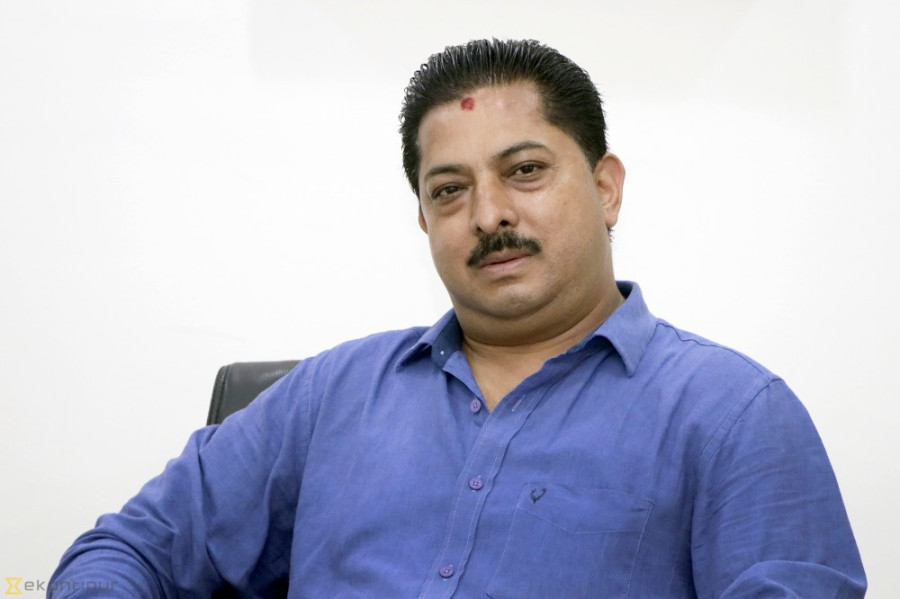Interviews
Anjan Shrestha: It is a great time to get into the business
In this interview with the Post’s Alisha Sijapati, Shrestha discusses Laxmi Group’s gradual progression and his current strategies on branding and promotion.
Alisha Sijapati
Anjan Shrestha is the executive director of Laxmi Group—a group of companies covering an array of businesses, from confectionery to automobiles. Established in 1973, Shrestha’s father and uncle started with Laxmi sweets, which manufactured candies using manual machines. But with rising demand over the following three years, the company imported semi-automatic machines. Now, Laxmi Group has diversified its products, from candies to chocolate bars and bubble gums. It is also the manufacturer of Nepal’s beloved bar—Choco Fun under the subsidiary Sujal Foods. But the group has more than just sweets on offer, because Laxmi Group became the sole authorised distributor of South Korean car brand Hyundai in 2009, through its subsidiary Laxmi InterContinental. In this interview with the Post’s Alisha Sijapati, Shrestha discusses Laxmi Group’s gradual progression and his current strategies on branding and promotion. Excerpts:
Hyundai is a prominent global auto brand. What are your strategies to build its market in Nepal?
Hyundai, all over the world has certain guidelines that come with strict rules and regulations, which we follow diligently. The only thing we do a little different is by giving it a Nepali touch with our schemes and advertisements. We try to keep up with the international standards—either through our state-of-art showrooms or through being easily accessible to our customers.
Before Laxmi Intercontinental took over the distribution of Hyundai, the company didn’t have a good reputation in the country due to AVCO International’s fiasco. How have you currently positioned Hyundai and your company in the market?
In 2008 and until mid-2009 there were two distributors—AVCO and us. AVCO already had a fair share of problems. However, it was in October 2009 when we were appointed the sole authorised distributor of Hyundai. At that point we went for an aggressive marketing and promotion strategy. We did it with full zeal and conviction. I also believe the first large showroom we launched in Thapathali set the benchmark for Hyundai and for us, which enhanced customer service. It was only then that customers started embracing the brand. With the number of Hyundai cars running on roads right now, I think we can call ourselves number one in the industry. Customers truly get an experience after buying the car but until then, ‘what you see is what you believe’. The first impression matters most, so Hyundai also exceeds expectations when it comes to design and style.
How does Hyundai stay afloat in the game despite stiff competition? What are the branding strategies of the company?
There’s definitely a lot of competition in the market, but everyone has their own choices to make at the end of the day. To try and be on top of our game, we constantly work towards consumer awareness and increasing brand value. We also have a campaign called ‘Hyundai pariwaar’ that offers special discounts in various partnered outlets. We even stay connected to our customers through social media platforms.
As Hyundai is expanding through showrooms in different parts of the country, what are your strategies while hiring new employees and keeping the existing team motivated?
We value our people. We try to be as accommodating to our employees as possible. In order to understand our work culture and environment, we train new employees. Additionally, we encourage our employees to be creative and we are open to new suggestions. In my experience, I have felt the younger generation come into the company with fresh energy and creative ideas, and we intend to foster them.
With Hyundai Eon taking over the roads of Nepal as taxis, how does it stay away from the associated negative stereotype?
If you go abroad you’ll find taxis from all sorts of brands—from Mercedes to Nissan to Toyota. I don’t see their brand image decreasing there. I think Nepali's perception is a little too ridiculous.
You have recently introduced two e-vehicles in the market, what are the challenges of selling these kinds of products and what will be your action plan for the repercussions of battery disposal?
With growing concern on environmental effects, e-vehicles are the way to go. We are all aware that fossil fuels will not be able to fulfil our energy needs in the near future. As part of our environment-friendly and responsible development, e-vehicles are being introduced in the market. The government is also giving it a priority.
By 2022, Hyundai plans to come up with 25 different electric models. We already have two models that we have introduced here—IONIQ and Kona—which have been sold over 17 and 100 units respectively. Battery disposal is something that has been a global problem. It’s been a part of various discussions and debates, especially on ways to manage it in the long run. The benefit for us Nepali distributors is, we work according to the international technology procedures. If the international engineers come up with a sustainable solution, we can apply it here too.
What advice would you give to future generations wanting to join the automobile industry?
Automobile industry has huge potential. It gives mobility to the economy and it increases the efficiency of individuals too. This industry plays a huge role in the economic cycle and the sector is growing here. There are a lot of exciting innovations and opportunities coming up. One has to have patience, it is a great time to get into the field.




 9.7°C Kathmandu
9.7°C Kathmandu












